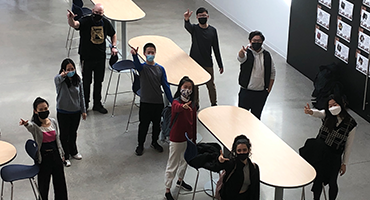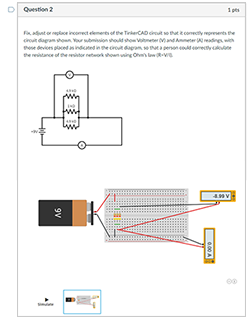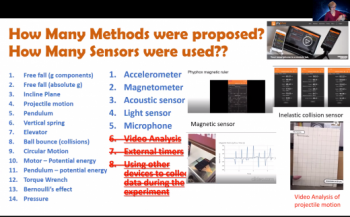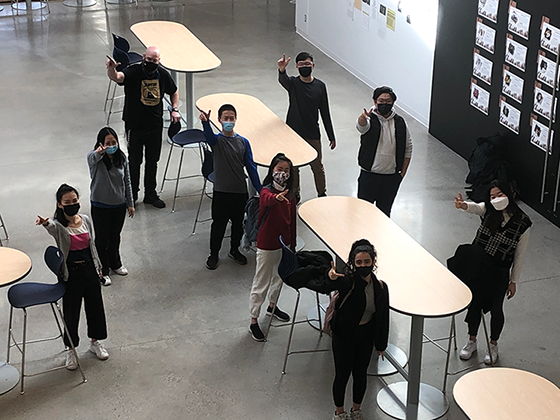First ever virtual UBC Physics Olympics: a larger-than-life success

"Welcome to the 2021 UBC Physics Olympics!" This announcement rang differently this year. Unlike any time before, it was not made in a large auditorium, but through the students' computer speakers. The students all gathered, virtually, to participate in a hands-on and minds-on team physics competition.
More than 400 high school students and teachers participated in this year's UBC Physics Olympics, one of the oldest and largest physics competitions in North America. Last year, the annual competition was cancelled due to COVID-19, only days before the competition’s scheduled date. The event organizers - professors from UBC Department of Physics & Astronomy and Department of Curriculum & Pedagogy - contemplated cancelling the event again this year, being aware of the challenges that teachers and students might face in order to participate. However, feedback from some teachers encouraged them to forge ahead.
“So many other opportunities for students have been cancelled this year”, a teacher said. Many students look forward to the event, and the last thing they wanted was for the UBC Physics Olympics to be cancelled for the second time.

students had to solve using an online circuit
simulator (click to enlarge)
But how could a competition that prides itself on student collaboration and hands-on experience happen virtually? Online resources, an amazing group of volunteers, and a year of hosting classes remotely led to creative ways to facilitate events that did not require the students to meet in person. Students competed in five different events: Fermi Questions, a Circuit lab (using online breadboards to build electric circuits, as shown in Fig. 1), Quizzics!, and two "Physics Lab at Home" pre-event projects.
The requirement for physical distancing and the limitation on gathering presented an interesting opportunity to explore tools that normally are not part of the Physics Olympics. For example, in the pre-event projects, students were asked to measure the speed of sound at 0° C and the gravitational acceleration in as many ways as they could, using their cellphones and a physics lab cellphone app called phyphox. A large number of online applications, including circuit simulators, survey tools, an online buzzer, and the UBC course management system Canvas, were also employed throughout the competition to make the event possible.
Students, though, once again proved that they are the creative ones. A team from Semiahmoo Secondary came up with 14 different ways to use the phyphox app on their phone to measure the acceleration of free fall (Fig. 2). In other cases, teams came up with methods to measure the temperature (one involving crickets!) that the judges themselves were not aware of. “Every year the students demonstrate a phenomenal aptitude for tackling challenging problems in unique ways”, said UBC Physics & Astronomy Professor Aaron Boley. This is notable because the problems are always changing. Professor Michael Hasinoff, also from UBC Department of Physics & Astronomy, explained, “Each year the organizers try to highlight one or two physics topics from the high school curriculum in the various events.” As you might imagine, there is a lot to cover, which makes the 50-70 volunteers essential for not just hosting the event, but for planning problems that are tractable, challenging, and fun.

Milner-Bolotin explained the various methods and sensors
that the teams used to measure an acceleration of free fall g.
At the end of a very close competition, the winners emerged. Congratulations to the R.E. Mountain Secondary team members (Fig. 3), who received the top overall prize, followed by Burnaby North Secondary “B” and Semiahmoo Secondary.
Making this virtual competition a reality had its own challenges. Indeed there were several technical issues along the way. Despite this, many students appreciated the opportunity to work with their friends to tackle physics problems. “[It’s a] great way to test our team-working skills and challenge our brain!” said a student. Another student mentioned how this is the student’s 4th year and final year participating in the UBC Physics Olympics. Many of the participants will go on to study physics in the future - in fact, one third of the volunteers involved in planning and developing the events were Physics Olympics participants themselves at one point.
“My students have been competing at the UBC Physics Olympics for 15+ years and each time the dedication, enthusiasm, and team spirit brought to the event is undeniably one of my highlights each teaching year,” said Bill Deagle, Physics Teacher from Carihi Secondary School. “The tasks are well thought-out and of an appropriate level to engage young minds in problem solving, deep thinking, and the importance of trust and teamwork. I will be back every year I can!”
The success of the event also depended on the physics and science teachers who supported their students and encouraged them to participate,” said Professor Marina Milner-Bolotin from the Department of Curriculum and Pedagogy. “At the same time, the parents and family members assisted the students in conducting the experiments when more than one person was needed to make it happen and the students were limited in collaborating with their peers or using their school’s science facilities.”
“We learned a lot by hosting this event virtually,” said Theresa Liao, Communications Coordinator of UBC Physics & Astronomy and one of the organizers. “However, we hope to see everyone back in-person next year for the 2022 UBC Physics Olympics!”

after the 41 ½ UBC Physics Olympics (photo provided by R.E. Mountain team)
Additional materials:
- Event rulebook and additional event information are available on the UBC Physics Olympics website.
- The top overall team - R.E. Mountain - was featured in the Aldergrove Star: Langley students take top prize at B.C.-wide UBC Physics Olympics
Media contacts:
Marina Milner-Bolotin
Phone 604 822 4234
Professor | Faculty of Education | Department of Curriculum and Pedagogy (EDCP)
marina.milner-bolotin@ubc.ca
Michael Hasinoff
Text 604-726-4108 and I will return your call
Professor, Department of Physics & Astronomy
hasinoff@physics.ubc.ca
Aaron Boley
Phone (604) 827-2641
Associate Professor, Department of Physics & Astronomy
aaron.boley@ubc.ca